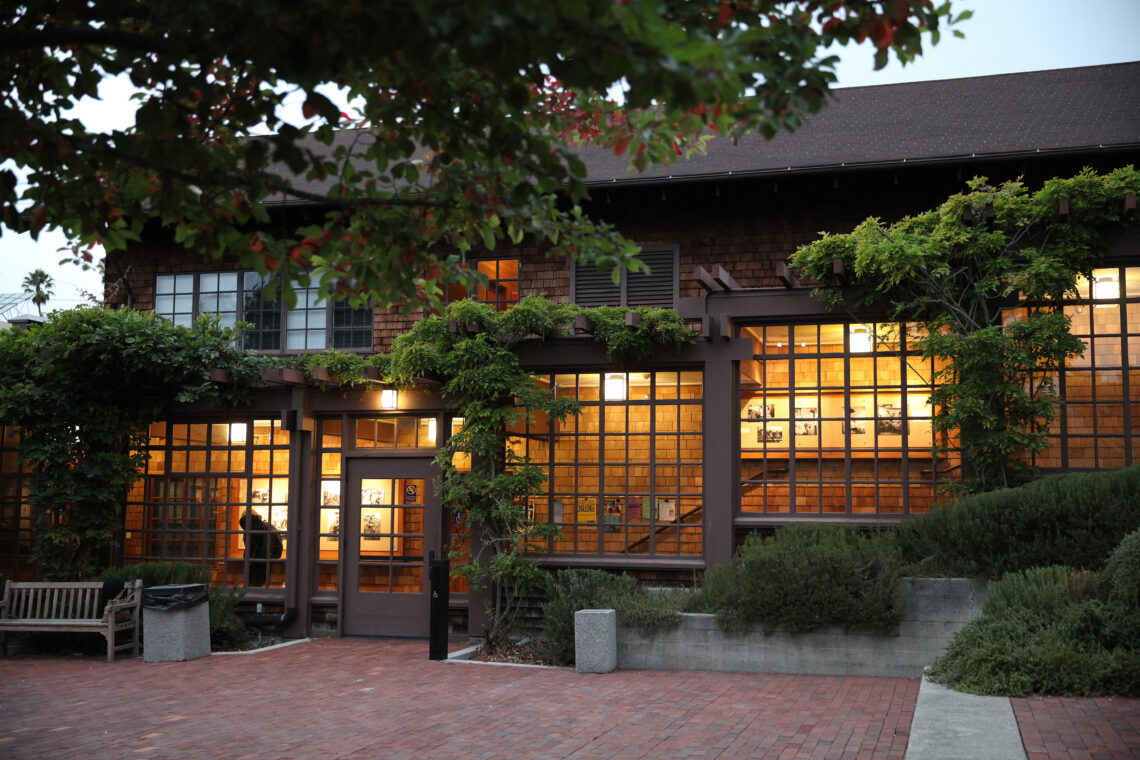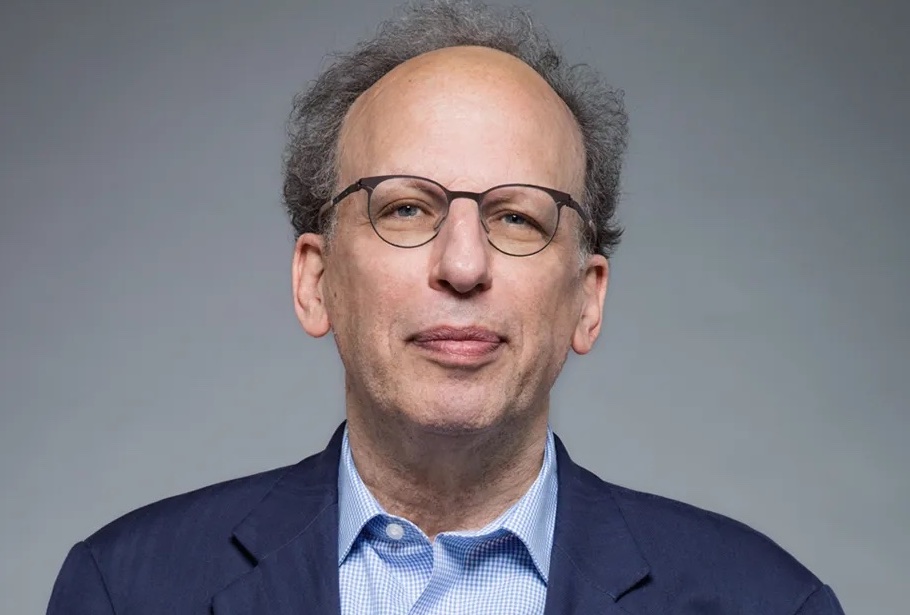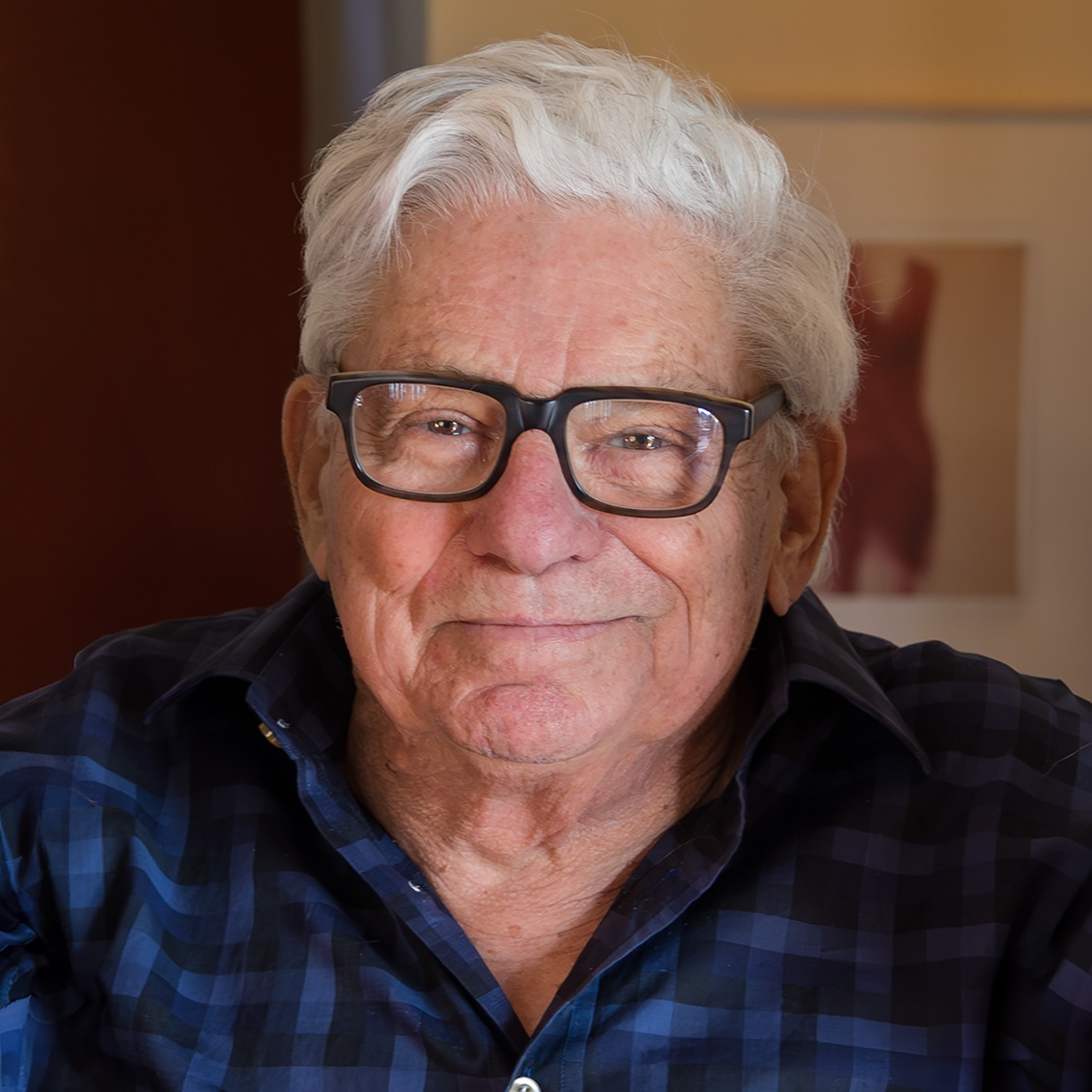
Andrew Stern in 2013. (Photo Peter Leonard)
The last remaining original faculty member of the UC Berkeley Graduate School of Journalism, Andrew Stern, has died. He was 92.
In 1969, the award-winning broadcast journalist was invited to start a new program in long-form broadcast journalism and documentary by founding Dean Edwin Bayley after a career at PBS and ABC News. In the two decades that followed, he built the school’s storied pedagogy in visual journalism and mentored dozens of students before retiring in 1994.
He never strayed far from the school.
“Andy had a deep and long-lasting impact on his students who continued to stay in touch with him decades after they had left our school,” Geeta Anand, dean of Berkeley Journalism, said. “They were inspired by him and felt seen and supported by him. When I arrived in Berkeley, years after he had retired, he reached out to welcome me and share ideas. He was a fountain of warmth, energy and enthusiasm for people, journalism, travel and life. We will all miss him terribly.”
Tom Leonard, who taught the history of the press and on propaganda at the J-School from 1976-1999 before transitioning to university librarian recalled the strong, indelible bond Stern created with his students teaching a production-oriented curriculum in “the cell” to those hungry to get into national television. “Coming from network television, even a ‘harsh’ criticism of a student’s work was based on what the ‘real world’ was going to expect from them going forward,” Leonard said. “He was really interested in pushing boundaries in journalism,” like recognizing early on the potential of Marlon Riggs, fostering the summer program for minority journalists at the school and hiring students to work on his film projects.
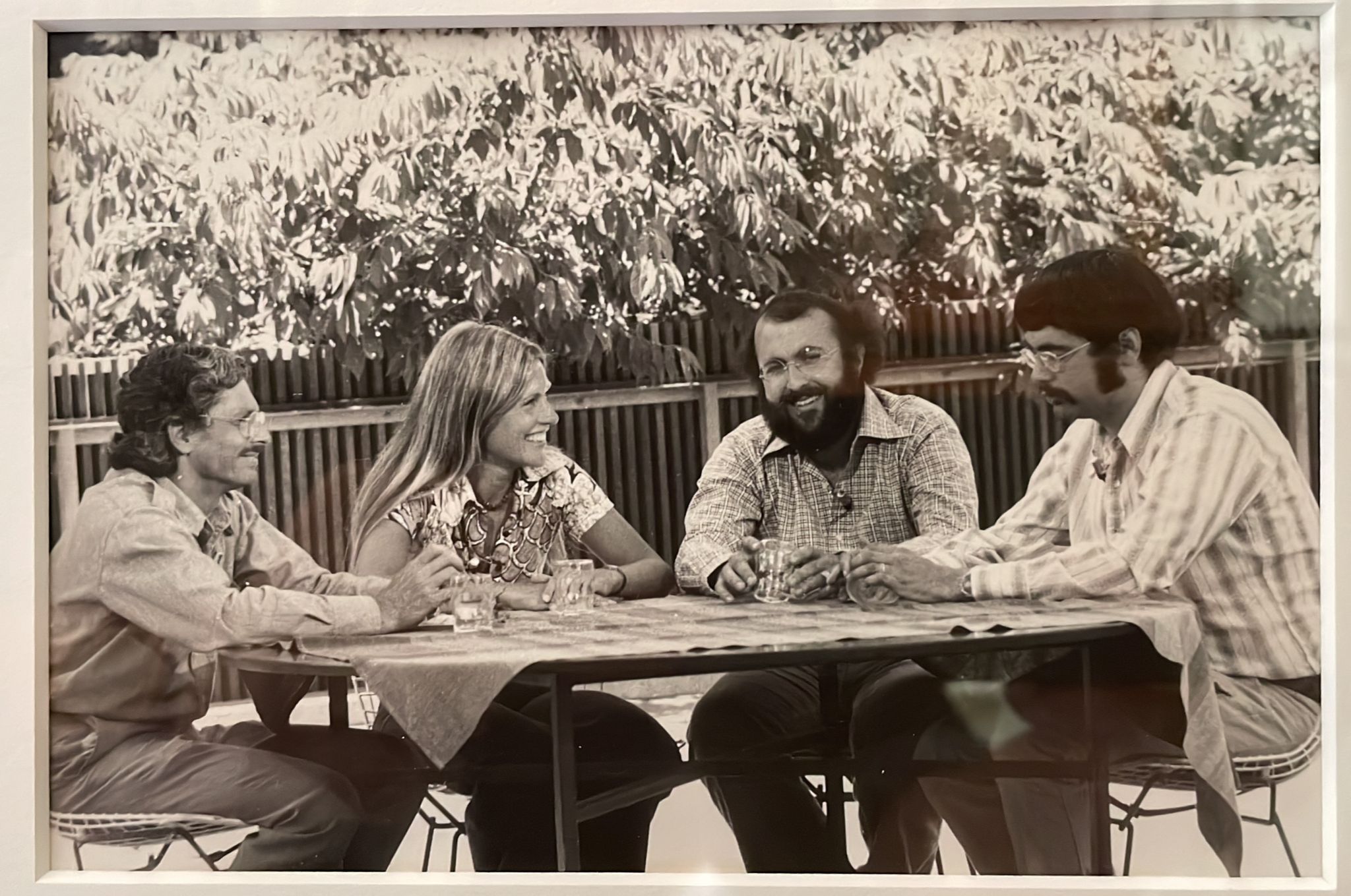
Andy Stern in the early 1970’s with his students Richard Gurman, Sam Shore and Linda Schacht. Richard and Sam’s thesis film “From conception to consumption: Are beef prices too high?” had just aired on PBS nationally, with Andy as executive producer and Linda associate producer. (Courtesy of Linda Schacht)
In a 2019 email to the Journalism School, Stern described how he convinced the aspiring filmmaker to come to Berkeley. “I was on the admissions committee when he applied to Berkeley, and his application came in from Harvard where he studied American history and had graduated with honors. His application was so outstanding that I asked Dean Bayley if we could bring him out to Berkeley for an interview. We knew he had also applied to the journalism program at Columbia.”
Stern said he tracked Marlon down at a TV station in Fort Worth and asked him if he wanted to visit Berkeley. He said, “I’ve already made up my mind.” He had looked up Stern’s profile and history in documentary film. Stern said Riggs was beloved by his classmates and later did an award-winning documentary on the history of Oakland blues with his classmate Peter Webster.
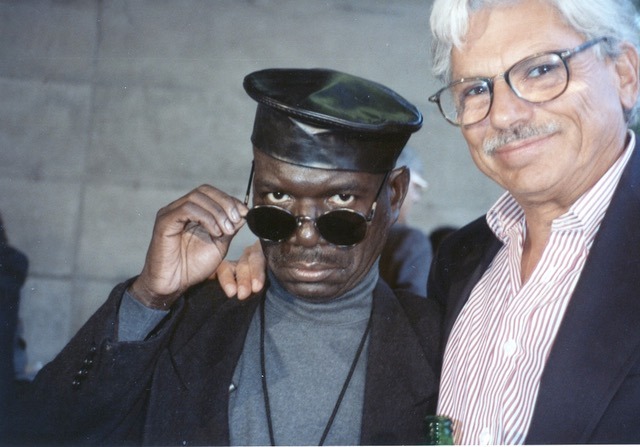
Andrew Stern and his former student, then teaching colleague, pioneering filmmaker Marlon T. Riggs. (Photo courtesy of Andrew Stern)
In the early 1980s, Stern hired his recently graduated former student to edit, “How Much is Enough: Decision Making in the Nuclear Age.” The hour-long documentary, produced, written and reported by Stern, was broadcast nationwide by PBS and six European countries and received many awards including the George Polk Award, the Thomas Storke Award, the Edward Weintal Prize, and Best Documentary at the U.S. Film Festival Park City (a precursor to the Sundance Film Festival).
“I always say he got his Ph.D. in editing,” Stern wrote in an email to the school. “He later became one of the youngest professors in the Humanities at Berkeley. Marlon went on to have a brilliant career before his death. We remained close until the end.”
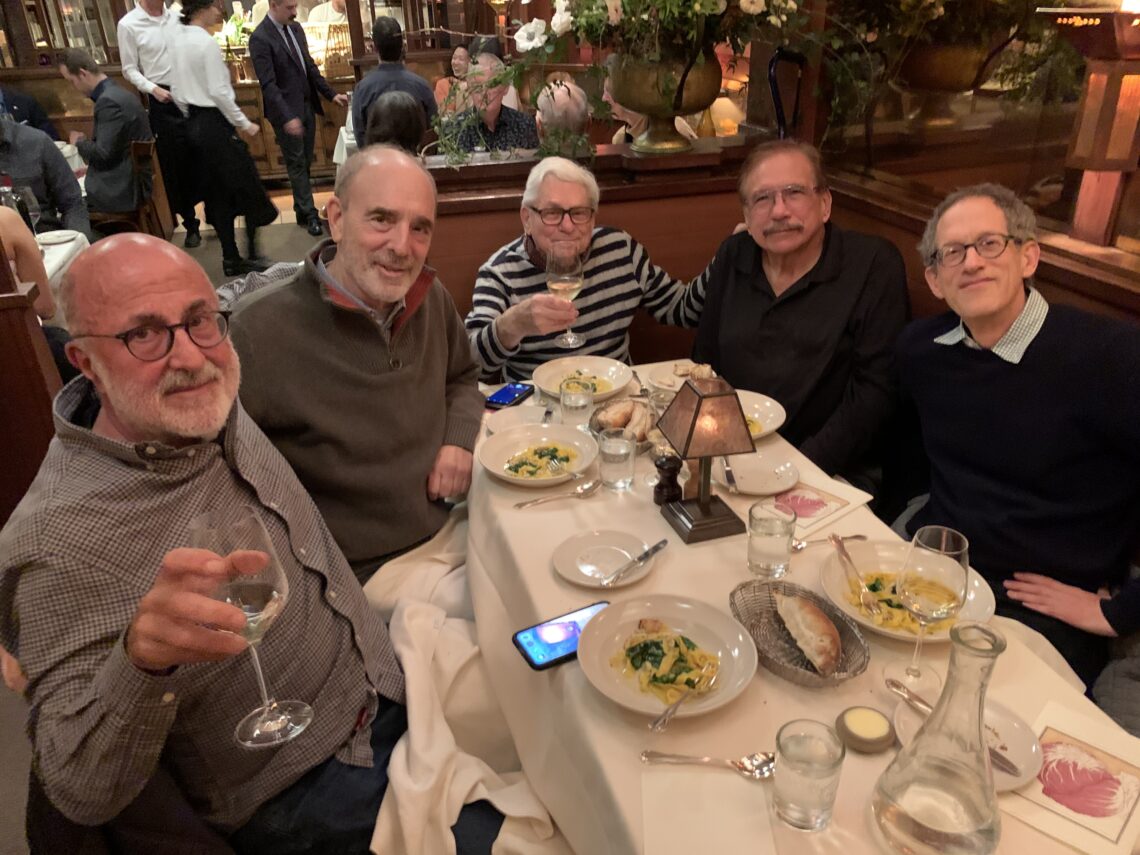
From left to right: Richard Gurman, Harvey Myman, Andy Stern, Lou DeCosta and Richard Zoglin celebrating Stern’s 89th birthday at Chez Panisse in January 2020. (Photo courtesy of Harvey Myman)
A charismatic teacher with a legacy of life-long mentoring
Stern had “exacting standards of taste” in everything from opera music to clothing to books, which he read voraciously, identifying unabashedly as a Francophile, Leonard said.
Bill Whitaker, a correspondent at “60 Minutes”, recalls Stern as “my professor, my mentor, my friend.”
“His TV news production course put a camera in my hand and opened my eyes to the rigors and rewards of a career that has fed my curiosity (and my family) for almost four decades,” Whitaker said. “Andy was cool, he’d been places, he’d done things, he had stories to tell and he taught us to use cameras and words to tell our stories.”
Behind that cool, Whitaker said, the “worldly exterior the Andy I came to know was more like a mother hen.” He kept an eye on him as he advanced in his career, and gave advice and critiques long after Whitaker had left graduate school.
Stern recommended Whitaker for his first job in news at KQED and later introduced Whitaker to the administrator of the CBS News Minority Training Program, which led to his first on-air reporting job. Several years after that, Stern connected Whitaker with the agent with whom he worked for the next 35 years.
“Over the years I’d hear from Andy when I did a story he liked and, never one to hold his tongue, he’d let me know when he thought I’d missed the mark … that’s what friends do,” Whitaker said. The two remained close in the years since. “Whenever work took me to the Bay Area, I’d try to stop by to see Andy in his beautiful house in the hills. He’d regale with his stories and tell of his latest project (he always had projects going). Andy was the kind of professor every student wishes to have and whose friendship I will always treasure.”
Harvey Myman — former senior executive editor and reporter in the newspaper industry including leading a team at the Orange County Register to a Pulitzer Prize; Sony, then HBO and ABC, running major TV production houses— described Stern as “an extraordinary fellow,” who was bright and engaged and whose home —shaped by European tastes and Upper East Side rhythms—was always open to his students.
“As one of the few students in my class who came directly out of undergraduate school, he was unlike any professor I had ever known. At its most basic, he was the first professor who insisted on being called by his first name,” Myman said.
His greatest gift as a teacher, Myman said, “was not simply that he taught us how to work with film and television, but that he taught us how to be journalists. With all the energy put into mastering the technology, his best, and toughest, notes were about the quality of our writing and reporting.”
In his later years, Myman said Stern remained sharp and focused on the news and how it was being covered. “His belief in the importance of journalists in society, and the essential role of the J-School in helping train them, was fundamental to him. In a complex world, it was where he found his simple truths.”
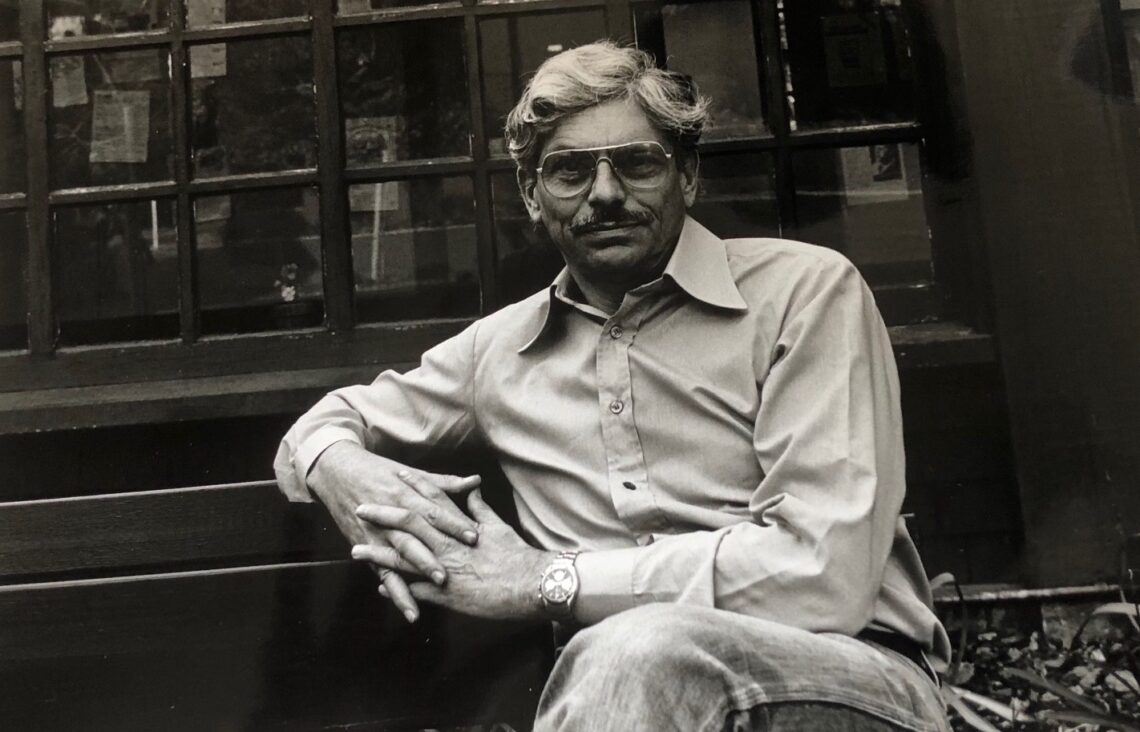
Andrew Stern in the courtyard of North Gate Hall. (Photo: UC Berkeley Graduate School of Journalism)
Linda Schacht, an Emmy award-winning television reporter who would go on to spend 20 years in local television in San Francisco and teach visual journalism and introduction to documentary filmmaking at the J-School from 1992 to 2012 said, “I owe everything to Andy Stern. He encouraged me to come to the J-School where so many of his students went on to be prize-winning and successful journalists. Those students are Andy’s legacy and were always the source of his pride. So lucky to have known him and learned from him.”
Richard Zoglin said Stern had a profound influence on him as a journalist. “I considered myself mainly a ‘print guy,’ and took his TV courses almost as an afterthought,” Zoglin said. “But they were incredibly important in shaping my understanding of TV news. I never worked in television, but spent much of my career writing about it — for TIME Magazine and others — and I can honestly say that Andy’s insights and critical perspective, along with the practical experience I gained in his classes, informed my thinking and writing almost every day. Even in his last years he stayed engaged and current, and I found him one of the most astute critics of TV news that I’ve ever known.”
Helen Malmgren (Ellsberg), who would go on to be an awarding-winning investigative reporter and writer at CBS/60 Minutes and is now director of the Investigative Stories Program at Xavier University of Louisiana, described Stern as unlike any other professor she had at Berkeley. “His teaching style was completely his own,” she said. “Sometimes you weren’t sure what he was getting at, then you’d understand that he was teaching you something bigger than just how to produce a news piece, then you’d realize that he wasn’t actually even trying to teach you that bigger, life-altering thing that you’d definitely just learned from him — he was simply trying to help you produce a great story. He was gracious, honest, and hilarious.”
When Andy turned 90, in the middle of the pandemic, Malmgren said Stern’s daughter Alex hosted a Zoom party for him. “Friends and former students called in from all over the world, and, as they started telling stories, it became clear what an impact Andy has had on generations of J-School graduates,” Malmgren said. “All those faces! Documentary producers, news anchors, photographers, writers. Some of them were old enough to have already retired, but they all sounded like students as they rehashed class discussions they’d had over dinner at Andy and Mary Lou’s house, and how those evenings had sparked their careers.”
Richard Gurman, a writer-producer who for more than 35 years has written and produced such classic network situation comedies as “Happy Days”, “Laverne and Shirley”, “Mork and Mindy”, “Facts of Life” and “Married… With Children”, said he first met Stern at his admissions interview for graduate school in 1971 and has been “an indispensable part” of his life ever since.
“As a mentor he guided me through the world of broadcast journalism,” Gurman said. “As a friend he exposed me to the pleasures of music, food, family sports, travel, literature, film, photography, red wine and very spirited conversation… all from the living room of his beautiful home in the Berkeley Hills and the tennis courts at The Rose Gardens and The Claremont. But Andy was much more than a beacon, lighting the way for curious students like me, he was the light itself.”
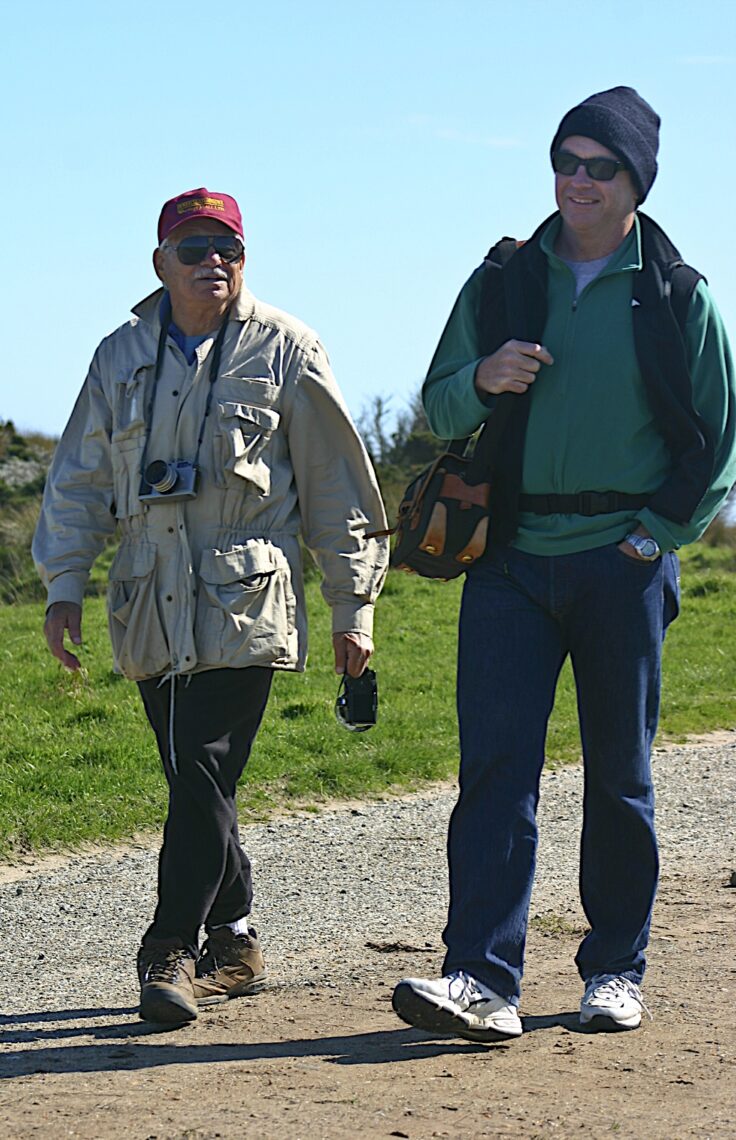
Andrew Stern visiting former student Vince Malmgren in New Zealand in 2010. (Photo courtesy of Helen Malmgren)
Joan Bieder, professor emeritus and former associate dean whose own journey to the school (1990-2016) from ABC News was through Stern’s recruitment, recalls the great affection Stern’s students held for him. “His students from years ago just adored him and are his legacy,” Bieder said. “They formed an allegiance with him that continued for years no matter where they ended up.”
Alex Stern says what made her father such a remarkable teacher and effective mentor was the space he gave his students to be who they were going to be. “He didn’t want his students cut in his image,” Stern said. “Some went on to become TV anchors, others in print or scripted television.”
Stern says academia was a role that really suited her father. “He was so passionate about training the next generation of journalists and threw himself completely into their projects and promoting the careers of women, of filmmakers of color and people with disabilities. He became a mentor, friend and sometimes paternal figure to his students,” she said.
She recalls the many lively parties her charismatic father would host at their house, with her mom Mary Lou cooking for students. And it touched her, in the years that followed, to watch these relationships thrive. “I remember when Marlon Riggs was in the hospital at the end of his life and my dad washed his feet, or when Vince Malmgren flew up to help my dad after a surgery.”
“It’s only been a few weeks since he died, but I still think, “‘I’d like to talk with Andy about this in the news, or this book,’” Leonard said. “In fact, one of the last conversations I had with him was about Zoglin’s book “Elvis in Vegas: How the King Reinvented the Las Vegas Show.”
Andrew (André) Stern, born in Munich, Germany, in 1931, worked as a documentary photographer in the late 1950s and early 1960s in New York and Washington, D.C. After graduating from Dartmouth in 1952, and spending a year at the University of Geneva and the Sorbonne in Paris, he interned with the photographer Hans Namuth, known for his widely published photographs of abstract expressionist painters such as Jackson Pollock, Willem De Kooning and Enrico Donati. Later he worked for the New York Herald Tribune, before moving to Washington, D.C., as a radio producer for the Voice of America. From there, he went to work for Howard K. Smith at ABC News. Stern was then hired by the Graduate School of Journalism at Columbia University as an adjunct professor. That fall, he became a producer of the WNET program “SOUL!,” the first broadcast that featured exclusively Black music and public affairs, which won a Peabody Award.
Later, he worked at NET (early PBS) where he produced half-hour and hour programs, including “Hiroshima, 1965,” “Brunswick, GA,” “The Quiet Conflict,” and many others.
After retiring, Stern spent five years traveling back and forth between his home in Berkeley and the former Soviet Union, where he and a handful of former students worked with young journalists and newly independent television stations. After returning to Berkeley in the late 1990s, he devoted his time to scanning and reprinting his past photojournalism work.
By Marlena Telvick
Donations to the documentary film program’s Fine Cut Fund can be made in Stern’s honor here.

